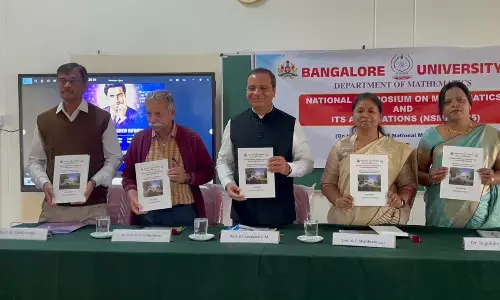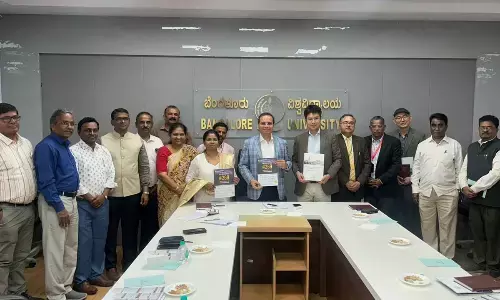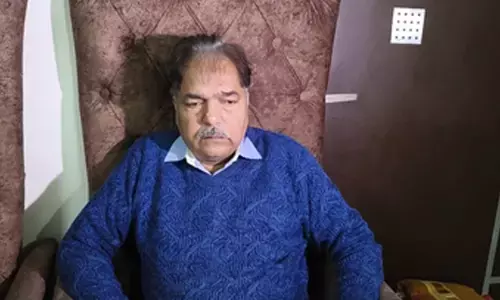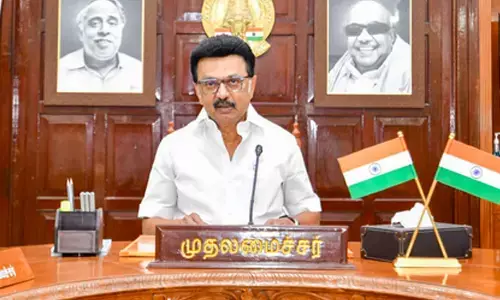MyVoice: Views of our readers 9th July 2023

MyVoice: Views of our readers 2nd February 2026
A plethora of religious people & beliefs living by and large amicably with social harmony exemplifies unity amid the vast diversity that is 'Akhand Bharat.'
UCC ought to be universal, agreeable to all religions
A plethora of religious people & beliefs living by and large amicably with social harmony exemplifies unity amid the vast diversity that is 'Akhand Bharat.' A uniform civil law to govern these religions may not be in existence as yet, due to various reasons but let's not forget that personal laws which are good and acceptable for one religion aren't for the other. A law on marriages is an example. Every personal law has been diligently drafted abiding by tenets existing in the religious scriptures. They are, as such, diverse and different. To bring in commonality and uniformity would entail the fusion of personal laws of all the religions. Which personal law to take as a grounding base and formulate a universal common civil law will become debatable and, perhaps, controversial too. As all the acts relating to marriage, divorce, inheritance, maintenance etc., are vast and need an in-depth study to ascertain loopholes existing, if any, the effort to bring in uniformity will become a gigantic task. A time line to come out with a unified civil law is thus challenging. What is agreeable to some is disagreeable to many. Controversial case laws and verdicts which would have been delivered by various courts across the country can help the Law Commission come up with a report which is universal and agreeable to all religions. This is a humble suggestion.
– N R Raghuram, Hyderabad
No-holds-barred debate
The Law Commission’s notification on the Uniform Civil Code (UCC), and BJP manifesto on implementation of the UCC in the country could not have come at an appropriate juncture that must definitely prove a virtual ‘double engine’ as this event cannot wait any longer. The ills of the Nehruvian era and the so-called Dr Ambedkar, who was lauded as architect of Indian Constitution, did precious little in this connection. The argument for UCC is now gradually boiling down to the fact that the majority religion should show the spirit of accommodation rather than bringing about changes in the religious practices of others, albeit they may be pushing an aspiring generation of women back into dark dungeons as we are witnessing in Afghanistan, Pakistan, Syria and other parts that are under the control of the IS or mindless and diehard religious groups of different kind.
The big takeaway of the UCC lies in the restoration of dignity to women, by way of improved protection, security, independence, financial and religious emancipation with no male dominance or diktat to decide their fate. One naturally expects stonewalling by the religious groups, particularly among the Muslim community swearing on the 'shariat,' which calls for an open, frank no-holds-barred debate to soften and dilute their rigidity. All Indians must learn to live together with this national objectives in mind, in which religion must not be allowed to play the role of a spoilsport.
–K V Raghuram, Wayanad
Base UCC on Special Marriage Act
The Hindu Code Bill is also applicable to Buddhists, Jains, and Sikhs, Virashaivas, Lingayats, and followers of the Brahmo and Prarthana or Arya Samaj. Other acts are: the Parsi Marriage and Divorce (Amendment) Act, 1988 (amendment to the Parsi Marriage and Divorce Act, 1936), the Christian Marriage Act of 1872 and the Special Marriage Act, 1954. The Special Marriage Act, 1954 (SMA) are the other acts. The SMA is applicable to entire India and extends to intending spouses who are both Indian nationals living abroad.
All these acts prohibit the bigamy (marrying someone else while simultaneously being married to a spouse who is still living) and polygamy (the custom of having more than one wife at the same time). These acts are punishable under sections 494 and 495 of the Indian Penal Code, 1860.
However the bigamy and polygamy are not criminal offences under the Shariat Application Act 1937 ( Muslim Personal Law) (MPL). Besides although section 494 (6) of IPC makes bigamy a criminal offense, section 2 (7) of MPL allows the application of polygamy on Muslims. It is also on the side of the legitimacy of polygamy. In fact the Supreme Court has ruled that a fundamental right to profess Islam does not include the practice of polygamy.
The system of triple talaq (when a husband pronounces three repudiations at once to divorce his wife) has been banned from August 01, 2019 onwards with the passing of the Muslim Women (Protection of Rights on Marriage) Act 2019 on July 30, 2019.
Some opposition parties have opposed the UCC, but to prevent rising litigations related to marriage, divorce, property and inheritance, the Special Marriage Act, 1954 (SMA) seems to be the best option, since it governs a civil marriage where the state sanctions the marriage rather than the religion. The proposed UCC could be based more or less on the lines of the SMA.
–Raju Vernekar, Mumbai Amartya Sen on UCC
Nobel Laureate Amartya Sen has come out openly against the attempt to enact a Uniform Civil Code and even termed it ‘fraudulent’. In his words, our society has a lot of diversities like different religions and different races. We have lived with differences for thousands of years and can live another thousand years. We have evolved to be heterogeneous and pluralist. He has pointed out that there is an unmistakable link between a UCC and Hindu revivalism. The BJP is giving clear indication that it will make it a big issue in the fond hope of harvesting more votes in the 2024 general election. But then, it is unlikely to give electoral dividends as the Ram temple issue once did. It cannot have the same emotional appeal as the Ayodhya temple. Interestingly, some BJP leaders have called opponents of the UCC ‘anti-national’.
A UCC has far-reaching implications and consequences as it relates to matters such as marriage, divorce, maintenance, adoption and inheritance. It is significant that the BJP has not made it clear whether the new set of laws will be ‘secular,’ a word that usually sticks in its throat. It seems to be for drafting the UCC by drawing upon the ‘best traditions’ and harmonizing them with the modern times. However, what it thinks to be the ‘best traditions’ could be actually regressive. The party is committed to ‘protecting ‘culture and heritage’. Will it then be progressive enough to correct inherent caste and gender biases in the Hindu personal laws?
A UCC will go against what is called ‘a system of legal pluralism’ that lets different religious communities be governed by their own codes of personal laws. Won’t a UCC curtail the right of citizens to practise their faith and live on its basis and render it difficult to preserve distinct religious identities? Is it possible to extricate sociocultural practices from religion for the implementation of a UCC? Can a UCC be enacted at the cost of constitutional rights and the constitutionally guaranteed freedom of religion?
– G David Milton, Maruthancode, TN
UCC: More pressing issues don't matter
The most dangerous and repressive game politicians often indulge in is the game of 'Communal Cards'. I call it dangerous because so far thousands of innocent people have been killed and properties worth thousands of crores of rupees have been lost whenever our politicians play out these communal cards.The term 'Vote Bank Politics' is just a euphemism for this callous game.It is a pity that almost all our parties indulge in this game at one time or the other. The British had played this game for their advantage till the last minute of their exit from our country,causing lots of bloodshed and heart burn.The Congress used this card in the 1980s soon after the verdict in Shah Bano Begum case.Regional parties too resort to this game for their political milage.The BJP is a past-master in this game and the UCC is its latest ploy from the playbook when State and Parliament elections are round the corner.Do we really need this UCC? The 21st Law Commission categorically said that the UCC is "not necessary,nor desirable".The BJP however is evidently hell-bent to bring out the Code in the name of 'Gender Justice'.It is true that injustice is perpetrated to woman in every conceivable issue at all places.It has been going on since the days of our epics.In reality exploitation and discrimination of woman has been there in one form or other in all our communities.
If woman can be deserted and divorced at will in one community,she has no equal property rights in practice in another community,and she can't enter places of worship or take up the profession of her choice in yet another community!Every day she has to face domestic violence,insecurity and inequality at work place.So much for the Woman Reservation Bill.Yes,there is a lot to be done to give justice to the distaff side.But will the proposed UCC address and redress all these issues?
When this UCC topic was broached way back in the Constituent Assembly,members were sharply divided in their opinion about it.Hence it was incorporated in the Directive Principles.It is also true that the Apex Court also in the past made passing references to the need of a Common Code.We have lived as a nation for 76 years without a Common Code because we feel that it is not as important as many other issues like the Woman Reservation Bill or allowing the minorities to enjoy Fundamental Rights in letter and spirit.
There are many pressing and crying issues like providing health,education, houses,and jobs to all,removing penury and ignorance,uprooting corruption,unearthing of black money and so on and so forth.Many of our governments have miserably failed in all these areas. The BJP government at the Centre too has not provided lakhs of jobs and not brought back billions of black money stashed away in foreign banks as promised by Modi.So,think of doing something about these promises,Modi sir and the UCC can wait.
–M Somasekhar Prasad, Hyderabad
CELEBRATING MONSOON
A long, dry spell of scorching
Summer ceased,
Clusters of dark clouds
Gathering, sailing in the sky,
Lightnings forking across
The firmament, illumining,
Thunders rumbling, drumming
Along the blue-tracks,
Pearly rain-drops descending,
Patterning on the roof-tops
Of houses, creating rainy melodies,
Quenching the long-parched
Tongue of the earth,
Drenching the bosom of fields,
The countenances of farmers
Beaming with happiness;
In our terrace garden, all plants
Awakening from their withered
And wilted state with
raindrops
Glistening on their leaves
Swaying joyfully, birds
Shaking raindrops off their bodies
And wings warbling monsoon
Melodies from tree branches,
Bevy of butterflies flitting
All over flashing their
colourful wings,
Squirrels scampering among plants,
Their eyes gleaming, their tails vibrating,
It's all the celebration of monsoon
We welcome heartily, happily and hopefully.
–Dr Venugopala Rao Kaki, Kakinada
India drowning in plastic waste
The article captioned ‘Let’s beat plastic pollution’ is another reminder to the careless behavior of pubic in using plastics in daily life. I continue that plastic waste remains a top environmental problem. The volumes of single use plastics went up exponentially during the pandemic, putting at risk on waste management. Imagine a world where there is more plastic debris than fish in the oceans. Thirty years from now in the 2050, this may be a reality if we do not stop single use plastics such as plastic bottles, cups, plates, bags and other miscellaneous items. The warning comes from the UN which also predicts that by then 99% of all sea birds will have plastic in their digestive system .The milk yielding animals also have plastic in their digestive system and toxins from the plastics in the form of micro plastics have already entered our bodies through the food chain creating numerous health problems .The plastic waste time bomb is ticking and we are far away from defusing it.
According to World Economic Dorum, every minute one garbage truck of plastic is dumped in to our oceans. From rivers, plastic debris going in to the oceans and the mighty 3 rivers in India – Indus, Ganga and Brhmaputra – are already badly polluted with plastic waste.
Plastic products constitute two major categories, one is thermoplastics which are recyclable, the second is thermoset plastics which are non-recyclable. The consumption of plastic in India is increasing by a compounded annual growth of rate of 10% every year. Most of our plastic consumption ends up in waste. According to experts, India lacks a formal system of plastic waste management. Plastic waste piles up on land, flow into water bodies, blocks drains and sewers, poison and kill aquatic life and animals digestive systems are at a great risk. India is drowning in its own plastic waste.
We should not bequeath a burial ground to our progeny with our reckless behavior with environment and particularly mother earth. So much is
written and said about abusing of plastics and polythene by us but the realization to behave judiciously has not yet been dawned on us. Mother Dharani/earth forgive us as we are openly and brazenly abusing you instead of respecting you.
– Rama Krishna M, Kakinada
Probe terror angle in Falaknuma mishap
It is a bad incident that happened in the state where Falaknuma train caught fire, resulting in the gutting of several bogies. Investigation about the incident should be done properly because this train mishap can be considered a terroristic activity before the assembly elections in the state and the Lok Sabha elections in the country. South Central Railway had received threatening letter just a few days ago, threatening that Odisha-type of train disaster would occur and it happened truly in Falaknuma express incident. Some sources say that the train fire was caused by a cigarette butt. Falaknuma train accident may be a terroristic activity before the elections. Security should be increased at all levels in the country especially in the railway routes and in the railway stations in view of terroristic activities in the country before the elections.
V Bhagirath Kumar, Hyderabad
Nephews are potential threats in politics
Sharad Pawar played a long innings in Indian politics, though he is yet to realise his ultimate dream of becoming the Prime Minister. In pursuing the goal, he donned many roles and played many games. The Prime Ministers including the present PM courted him. Ditching and again patching up remained his game, be it with Congress or others. However, for once he seems to have been outwitted by his nephew Ajit Pawar who told him to quit and keep quiet in as many words by taking away majority of party MLAs with him.
Finally, it looks like the master manipulator is outsmarted, though the veteran may bounce back. The coup couldn't have been possible without the blessings of BJP from behind the curtain. Ajit Pawar is wooed and lured with the promise of CM's chair that can end the tenure of Shinde who came to power through backdoor, thanks to BJP. Now Shinde and his gang are jittery. In the strange politics of Maharashtra, he may be downsized as deputy CM like Fadnavis who was once the CM. The game plan of BJP is to create a rift in the regional parties and intervene to dismember them. Blood is said to be thicker than water. But there have been eternal feuds in the blood line. It was there in Shivasena between the boss and the nephew. It is the same in Pawar's NCP. Back home, we have witnessed how CBN dethroned NTR. The nephews seem to be potential threats. Once there was a talk of Harish Rao revolting against his uncle KCR though now he sings peans of his uncle louder than anyone else.
–Vinay Bhushan Bhagwaty, Hyderabad
Awkward play of politicos
Not just Maharashtra but the entire political landscape in India has become like a circus. Politicians have become like trapeze artistes swinging from one end to another without missing a step. With its many twists and turns, the present situation in Maharashtra also resembles a Bollywood potboiler and the people are kept guessing on how the plot will end. Only when the movie ends will we know the hero was and who the villain. The present CM of Maharashtra Eknath Shinde will be the most worried man in the government. Ajit Pawar has made known his intention to become the CM publicly. He is a better politician and better suited for the post. The Shinde group has also become redundant for the survival of the government and a repeat of the Goa situation is on the cards. Kirit Somaiya has been left twiddling his thumbs by the NCP joining the government. After running a sustained campaign accusing some members of the NCP, he now finds them joining hands with his own party and it would be like some policeman forced to salute one whom he wanted to imprison. The biggest gainer in this tug of war appears to be the Congress as the BJP is well on the way to obliterate all regional parties which could offer it a big challenge in the states.
–Anthony Henriques, Mumbai
A great artiste & gifted director
Guru Dutt Shiv Shankar Padukone whose sensitive portrayals of roles earned him the encomiums of both the film critics and the cine goers was born on 9 July 1925 in a Brahmin family in Mangalore. He spent his boyhood and youth in Calcutta where he came under the impact of Bengali Cinema and literature.
After matriculation, he found academic life too ‘fastidious and even futile’ and decided to join Uday Shanker’s academy in Almora. He showed penchant for Indian Classical dance forms, practised them for two years and joined Pune’s Prabhat Film Company as a dance director. The desire to become a director, however, haunted him. As an assistant of Prabhat directors Vishram Bedekar and P L Santoshi, he learnt all the intricacies of film direction and choeography and worked as a screen choreographer for the movie ‘Hum Ek Hai’ in 1946. He mastered the art of film making and direction under A Banerji’s Famous Pictures and Gyan Mukherji in Bombay Talkies. Gradually, he rose to the level Chief Assistant Director to Amiya Chakrabarty.
Guru Dutt made his debut as director in ‘Baazi’ in 1951. But the film ‘Aar Paar’ which he produced and directed while donning the lead role consolidated his position in the film world. His third directorial venture was in 1955 when he made ‘Mr. and Mrs. 55.’ As all three films became commercially successful, Guru Dutt earned name and fame as a director “whose style was slick, polished and satirical.’ With the runaway hit ‘CID’ wherein Dev Anand played the role of a tough hero, Guru Gutt’s name rose to envious heights. ‘Pyasa’ made in 1957 further elevated him to starry heights as a consummate director with the message that society should learn how to honour a rare genius in his own life time. With the theme revolving around an ‘an unrecognized and unhonoured poet, and a sympathetic prostitute, the film ran to packed houses and brought out the touch of artistic genius of Guru Dutt.
In ‘Kaagaz ke Phool,’ he foresaw his own gloomy days ahead. The film showed a director falling in love with a heroine, his tragic lapse into anonymity and death. The film, despite being India’s first cinema scope, bombed at the box office. A disillusioned Guru Dutt gave up his artistic ambitions to make commercially successful films. No wonder, ‘Chaudhwin Ka Chand,’ a formula film made by him turned into a box office hit. He made another movie ‘Sahib Bibi Aur Gulam’ a serious film where he effected an unfair compromise between his artistic vision and commercial exigencies. The movie was a damp squib on both the counts.
Guru Dutt’s convictions and philosophy about the film medium lay in a shambles. He accepted just four acting roles, he failed to stage a comeback in any of the movies. Financial bankruptcy apart, Guru Dutt’s private life started disintegrating. Devoid of domestic peace and happiness, he took to alcohol and sought solace in the company of Waheeda. When his wife stood in the way, Guru Dutt broke up with Waheeda and lived aloof from his wife and children. An introvert, Guru Dutt could never accept ‘failure’ either in his private life or film productions. Being a man of hyper sensitive temperament, he tried to end his life many times. He was always haunted by the feeling that he was far ahead of his times and the society was too indifferent to appreciate his artistic vision. On October 10, 1964, he registered his protest against society by swallowing a lethal dose of sleeping pills.
In his death, the film world lost one of the great film artistes and innovative directors. In an article titled ‘Classics and Cash’ he bemoaned ‘Posthumous acclaim has been the tragic fate of many creators of classics’ and ironically the same fate awaited him – that was Guru Dutt, one of the most sensitive cine artistes of yore.
– S M Kompella, Kakinada-3
















